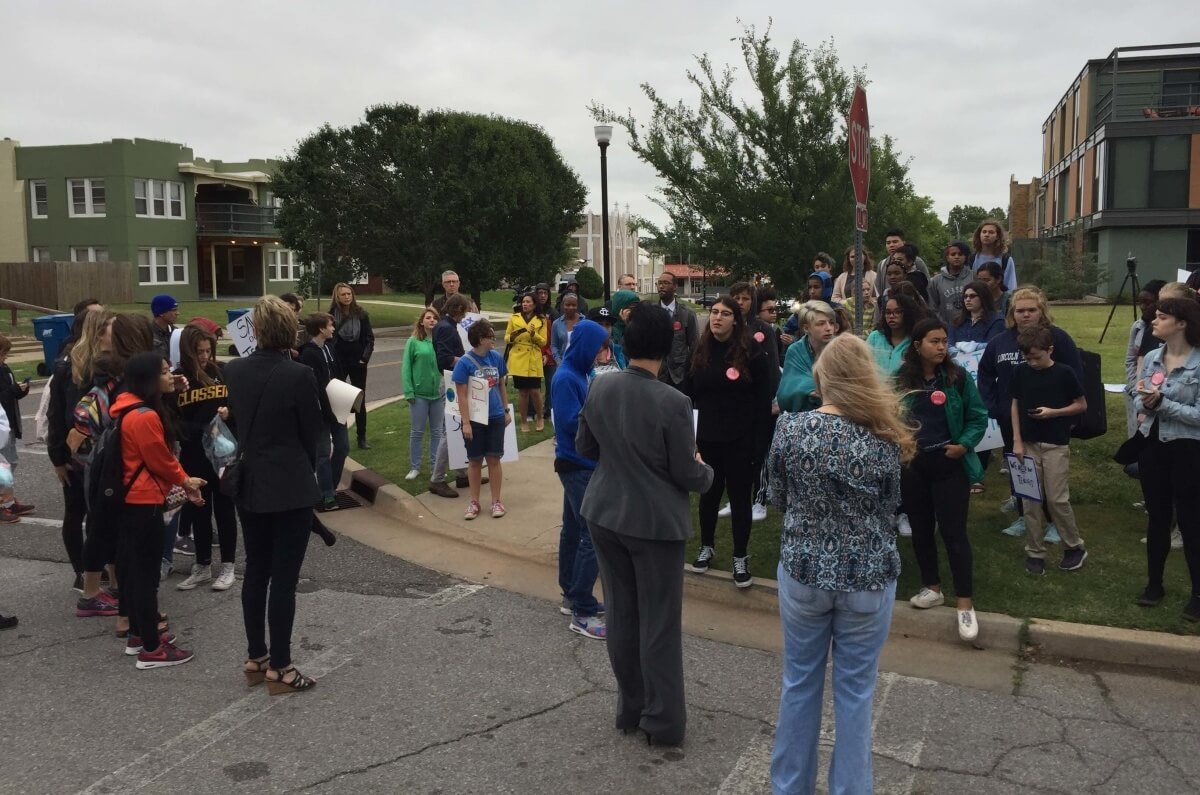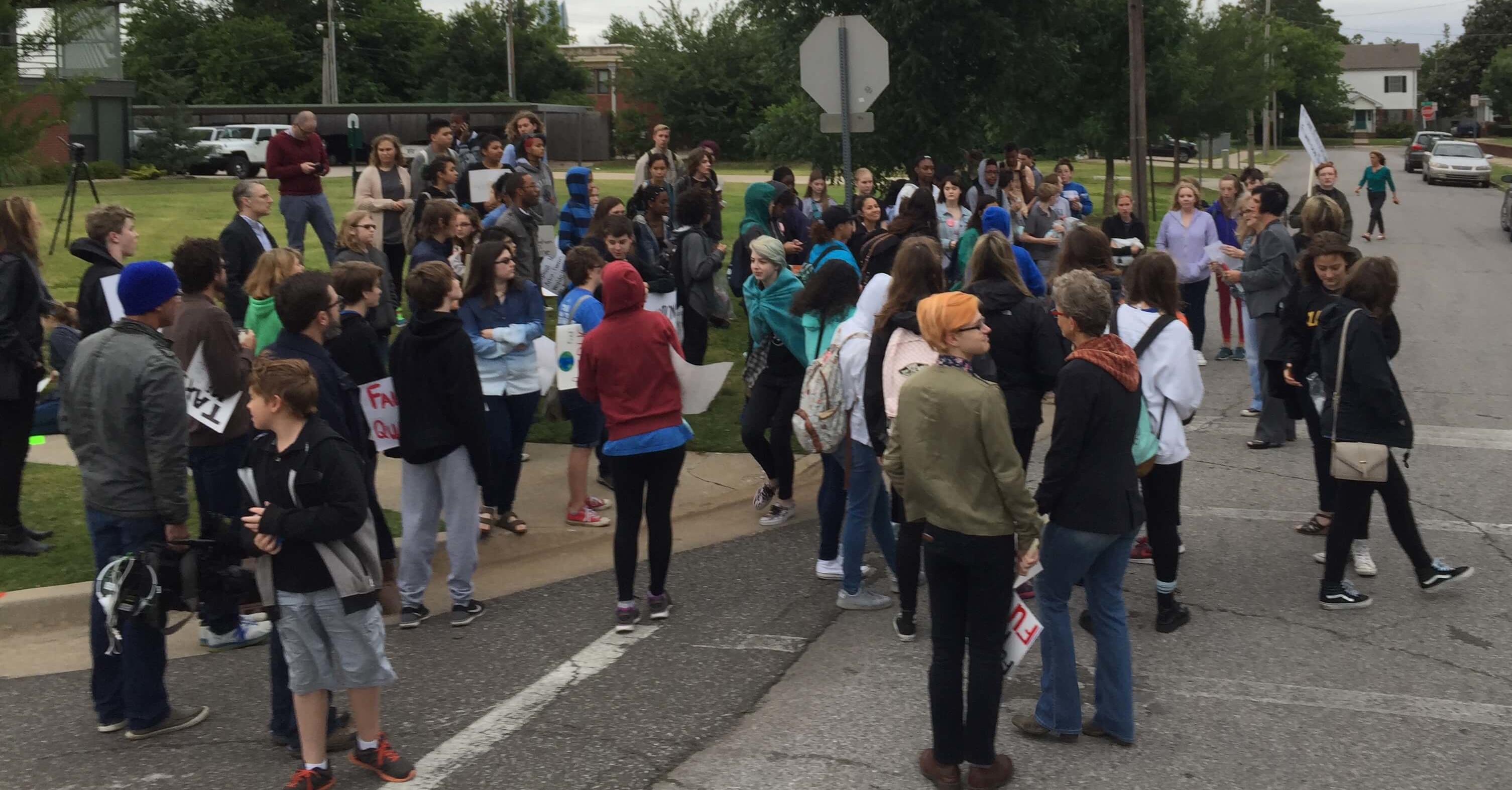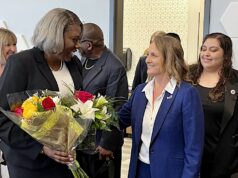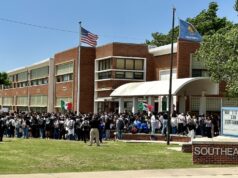In an effort one screaming teenager dubbed “civil disobedience,” dozens of Classen School of Advanced Studies students and their parents marched three miles to the Oklahoma Capitol this morning to protest education funding cuts.
“It’s finally come down to affect us as we’re seeing entire programs get cut, our favorite teachers or subjects getting fired or getting cut,” said Jasper Urie-Lanman, a freshman at the high school. “For a while, it hadn’t been affecting us, but now we kind of realize that it really is.”
Urie-Lanman said he wants to be a writer when he grows up, and his friend, Dennis Hurst, said he wants to be a violinist. Hurst held a sign saying, “Fund education, fund our future.”
Hurst called the $30 million in approved and proposed cuts by OKCPS for next year’s budget “really detrimental to our future.”
Urie-Lanman agreed and said he hoped to send that message to lawmakers at 23rd and Lincoln.
“I’d like to see an actual change for once,” he said. “A lot of times when you protest, it’s hard to get an immediate change. But I think with actual students who care about their education and the future of such a great school in such a great school system, I think it could really make an effect if we all voice our concerns and opinions to the Legislators and to the people who make the decisions.”

Parents join students
Several parents accompanied the students in the march Wednesday.
Timothy Bradford, one half of OKC’s Short Order Poems group, showed up with signs to support his two children who attend Classen SAS.
“Classen SAS is an amazing school,” Bradford said after students had crossed Classen Boulevard heading east toward the Capitol. “For me, it’s been a wonderful place for both of my kids, and I worry about it becoming far less of a wonderful place. They’re talking shortened days, four days a week, cutting staff, (cutting) the arts.”
RELATED
High school junior: ‘Oklahoma is failing its students’ by Sophie Trachtenberg
A magnet school, Classen SAS is home to a middle school and the highest-performing high school in the Oklahoma City Public Schools District. The district has announced 208 teaching position reductions and 25 percent cuts to athletics and arts programs. Monday, more than 1,000 students walked out of district schools in protest of the ongoing belt-tightening.
“I feel a little bit like I’m out here doing this because my representatives, the Legislature, my governor, they’re not doing the job they’re appointed to do, and that’s to keep the state running and healthy, and that includes good infrastructure and good public education,” Bradford said. “We’re facing a situation where that’s really in jeopardy, and that means to me they’re not doing their job and that means I have to come out here and — not do their job — but remind them to do it.”
Bradford and Urie-Lanman said Wednesday’s protest was organized by Thomas and Chloe Massenat, children of former OKCPS school board member Laura Massenat. Bradford is a visiting assistant professor in English at Oklahoma State University. Another Classen SAS parent in attendance, Felix Linden, is a teacher elsewhere in the district.

Protesters too young to vote
Urie-Lanman, Hurst and many others in attendance will all be too young to vote in 2016 elections.
“That’s a problem,” Hurst said.
Abigail Hickman, a Classen SAS junior, said her 18th birthday will come two weeks after November’s general election.
“I’m annoyed (I won’t get to vote) because nothing is going to change between those two weeks,” she said before speculating about why the Legislature has accepted education funding cuts. “I think it’s an idea that they’re funding an average education for an average student. So arts and athletics, which are a staple here, aren’t really necessary. So they’re just going to provide an average education.”

‘Oh everything’s fine’
Bradford noted a recent Reuters article that discussed how oil and gas interests have kept their state tax burdens relatively low despite revenue issues in Oklahoma.
“While we’ve been making a lot of money through oil and gas during the boom, we weren’t putting money aside like other states,” he said. “We weren’t taxing it at rates that were really going to sustain or help our schools get ahead. Actually, we were shrinking the budget for public education, and I feel a little like an idiot that I didn’t know that and wasn’t on top of that.
“While things are good, you kind of roll with it and say, ‘Oh, everything’s fine.’ But now we’re in a really tight spot. You know, we could have been ahead of the game as far as budgeting for education if things had been taxed at a proper level during the boom. Now, where we are, certainly we’re not going to find extra money, but it’s just trying to keep the cuts from completely gutting things, keeping the school system relatively healthy.”






















